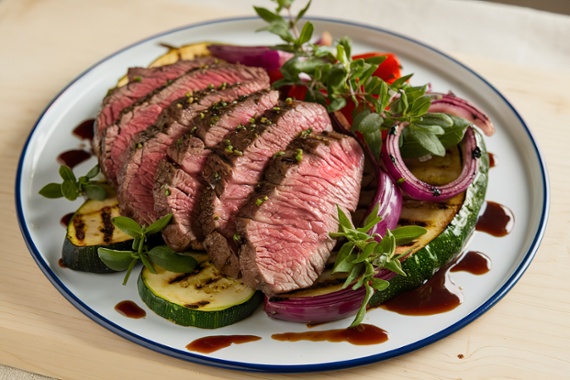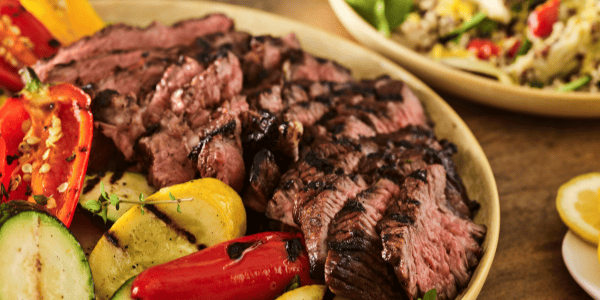|
|
| This is a paid advertisement for SmartBrief readers. The content does not necessarily reflect the view of SmartBrief or its Association partners. |
|
|
 
|
The Mediterranean Diet and Heart Health
 |
| (Vali Constantinescu / 500px/Getty Images) |
The Mediterranean diet is a healthful, sustainable way of eating based on the traditional dietary patterns of countries surrounding the Mediterranean Sea. It emphasizes the consumption of plant-based foods, such as fruits, vegetables, whole grains, legumes, nuts and seeds, along with fish, seafood, and moderate amounts dairy and lean proteins, including red meat. In this special report sponsored by the National Cattlemen's Beef Association, a contractor to the Beef Checkoff, registered dietitian nutritionists and other experts offer tips and information on following the Mediterranean diet and its heart-healthy benefits.

|
|
Research provides support for flexibility to include lean beef in a Mediterranean-style diet. Another recently published controlled feeding trial adds to the growing body of evidence that shows lean beef can support heart health. Explore the findings and earn free CPEUs.
|
|
|
|
|
|
  |
Expert Tips
Registered dietitian Emily Lachtrupp shares a 30-day Mediterranean diet meal plan designed to provide at least 90 grams of protein and 30 grams of fiber daily. The plan is adaptable for 1,500, 1,800 and 2,000 calorie intakes and emphasizes plant-based foods, healthful fats and a variety of protein sources. The Mediterranean diet is linked to numerous health benefits, including reduced risks of heart disease and improved cognitive function.
Registered dietitian nutritionist Tara Schmidt offers practical tips for making the Mediterranean diet more affordable, addressing common concerns about its cost. While the diet is celebrated for its health benefits, including reducing the risk of heart disease and diabetes, it can be expensive. Schmidt suggests strategies such as buying seasonal produce, opting for frozen fruits and vegetables, and using canned fish to maintain the diet's nutritional value without breaking the bank.
Registered dietitian nutritionist Liz Weiss and RD Amy Shapiro recommend the Mediterranean diet for women over 50 to support healthy aging and longevity. Key foods include leafy greens, beans, low-fat dairy, nuts and fatty fish, which provide essential nutrients like calcium, vitamin D, protein, fiber and omega-3 fatty acids. They emphasize the importance of these foods in maintaining bone health, cognitive function and overall vitality.
Registered dietitians Cayleigh McKenna and Andrea Hinojosa recommend protein-packed snacks for their benefits in boosting energy, controlling hunger, and supporting muscle and blood sugar health. Foods such as Greek yogurt, eggs, tuna, cottage cheese, jerky, string cheese, and deli turkey are highlighted as excellent options. They emphasize the importance of protein for muscle building and overall wellness, noting that these snacks can help maintain energy levels and reduce cravings.
 | Free CPEUs: The Beef Nutrition Education HUB
Over two decades of clinical research demonstrates that incorporating lean beef daily into DASH or Mediterranean-style eating patterns can support heart health. Explore recent publications and evidence-based continuing education on beef's role in health across the lifespan on the HUB. |
|---|
| |
|
|
  |
Heart Healthful
Registered dietitian nutritionist Heather Hodson Py emphasizes the importance of diet in reducing heart disease risk, recommending foods like avocados, chia seeds, flax seeds walnuts and leafy greens for their beneficial nutrients. These foods help manage cholesterol, blood pressure and inflammation, which are key factors in heart health. Py advises limiting saturated fats and processed foods to maintain a healthy heart.
|  | |
| | | |
| "Diet plays a central role in heart disease risk. [It influences] key factors like blood pressure, cholesterol, blood sugar, inflammation, and body weight." -- Heather Hodson Py, RDN, CDN |
|
Dietary protein benefits cardiovascular health in both direct and indirect ways, say registered dietitian nutritionist Angel Planells, a spokesperson for the Academy of Nutrition and Dietetics, and RD Michelle Routhenstein, a preventive cardiology dietitian and heart health expert. Emphasizing plant-based and lean proteins is crucial for heart health, especially for individuals with heart disease. "Unprocessed lean red meat like sirloin or tenderloin [steak] in moderate amounts can be part of a heart-healthy diet, especially when replacing processed meat or refined carbohydrates," says Planells. "Portion control and preparation methods matter," Planells says. "Grilled lean beef occasionally, alongside a high-fiber, plant-rich diet is different from daily burgers and fries."
|
Nutrition & Wellness
New research from Massachusetts General Hospital and Harvard Medical School suggests that increasing protein intake while using GLP-1 drugs like semaglutide can help prevent muscle loss, a common side effect of weight loss. The study, presented at the Endocrine Society's annual meeting, highlights that older adults and women are more susceptible to muscle loss, but higher protein consumption and strength training can mitigate this risk. Experts emphasize the importance of a balanced diet to maintain muscle mass and overall health, though the findings are preliminary and not yet peer-reviewed.
|
Science & Research
|
|
 |
| (ValentynVolkov/Getty Images) |
A meta-analysis to be presented at a meeting of the European Association for the Study of Diabetes found that the DASH, AHEI and Mediterranean diets are linked to a reduced risk of Type 2 diabetes, with the DASH diet linked to the most significant risk reduction at 23%. All three diets emphasize reducing unhealthful fats, sugars and processed foods, and the findings were consistent across various ethnic groups.
A study by the Aging Research Center at Karolinska Institutet followed over 2,400 older Swedish adults for 15 years, finding that those who adhered to healthful diets accumulated chronic diseases more slowly than those with inflammatory diets. The research highlights the benefits of the MIND diet, Alternative Healthy Eating Index, and Mediterranean diet, particularly in reducing cardiovascular and psychiatric conditions. The findings, published in Nature Aging, suggest that even small dietary changes can significantly impact aging, with pronounced benefits for women and those aged 78 and above.
|
| | |
